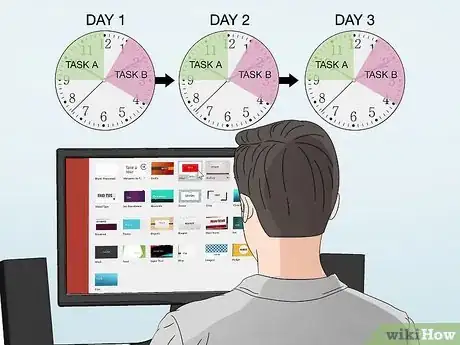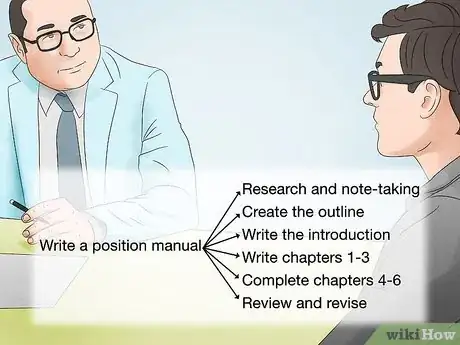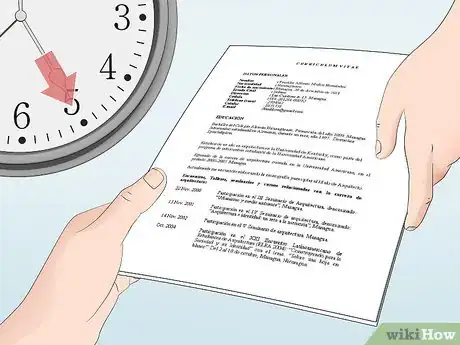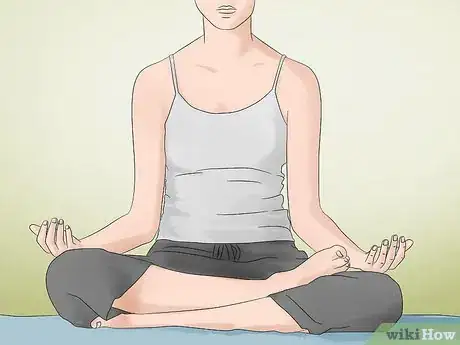This article was co-authored by Michael Dickerson, PsyD and by wikiHow staff writer, Amber Crain. Michael Dickerson is a Clinical Psychologist with over 6 years of experience working in college counseling. He specializes in anxiety, OCD, and men's mental health. Michael holds a BA in Psychology from California State University, Sacramento and a Doctor of Psychology (PsyD) from The Wright Institute in Berkeley CA.
There are 11 references cited in this article, which can be found at the bottom of the page.
This article has been viewed 19,965 times.
We all know the feeling of being stuck. We go through the motions every day, just trying to get by, and after a while it starts to feel like we'll never get out of this rut. It's unpleasant, to say the least. Feeling stuck doesn't have to be permanent way of life, though! There are things you can do to get unstuck and start living a more fulfilling life.
Steps
At Work
-
1Switch tasks if you’re having trouble focusing or solving a problem. Sometimes, just powering through isn’t a great solution. If you find yourself hung up on a problem or task for longer than 15 minutes, step away and work on something unrelated for a while to mentally reboot.[1] When you return, you'll feel more creative and ready to take on the challenge.[2]
- For example, if you’re putting together a tedious spreadsheet and the numbers start swimming before your eyes, switch gears and work on something else. Return some emails, file some paperwork, or reorganize your desk.
-
2Work on projects in short sessions rather than doing it all in one sitting. Setting aside one continuous block of time to complete a task or project can be unproductive, especially if you need to be creative or find a solution to a problem. Instead, try to schedule multiple blocks of time over the span of several days to get it done. That way, you can mentally reboot in between sessions of intense focus.[3]
- For example, if you’re working on a presentation, don’t cram all of your work into a single day! Schedule blocks of time over the course of a few days and chip away at the work slowly but surely.
Advertisement -
3Break large projects into smaller and more manageable tasks. If you’ve fallen behind on a project or you’re just having trouble getting started on a big task, it helps to break it into smaller tasks that feel more doable.[4] Make a list of each task to help you get organized and then start chipping away at it, one task at a time. When you complete something, check it off and move on to the next task.[5]
- For example, if your boss asks you to write a position manual for your department, break the task down into smaller tasks that aren’t so overwhelming.
- An example task list:
- Research and note-taking
- Create the outline
- Write the introduction
- Write chapters 1-3
- Complete chapters 4-6
- Review and revise
-
4Change your work environment to get a fresh perspective. Working in the same surroundings every day gets dull and repetitive. A change of scenery can kickstart those creative juices and get you going again! If you usually work in an office, try working outdoors or at a local coffee shop. If you can't leave your office or work space, work in the conference room for a few hours or switch to a different desk temporarily.[6] Other options:
- Work at a standing desk if you typically sit
- Move your office furniture around
- Add a plant to your desk to brighten your space
- Sit on a balance ball instead of a desk chair for a few hours
-
5Focus on completion rather than perfection. You always want to turn in good work, but being a stickler for perfection can drag you down into an unproductive space where you’re just spinning your wheels. Focus on giving the project your best effort rather than chasing a false idea of perfection.[7] Do your best in the amount of time you have and wrap it up. Tomorrow is another day.[8]
- For example, if your boss wants your report on their desk by the end of the day, don’t toil into the night until you get it absolutely perfect. Do the best you can in the time that you have and turn it in on time.
-
6Take a break if nothing else seems to be working. Even a short break to get some fresh air can help you refocus. Get up, walk away from your desk, and do something completely unrelated to work.[9] Go for a walk, meet a friend for lunch, or sit in the sun for a few minutes and relax your mind. Don’t look at any screens or check in on social media during this time.[10] You can also:
-
7Consider changing your job or career path if you feel stuck at work a lot. If you can't seem to shake off the stuck feeling no matter what you do, you may be burned out completely. Listen to what your gut is telling you. It might not be an easy or fast option, but you can always change jobs or career paths if you want to.[13] You might consider:
- Going back to school
- Switching positions within the same company
- Looking for other jobs that you're qualified for
- Starting your own business
In Your Personal Life
-
1Let go of the past so you can move forward. It’s easy to get stuck in a cycle of memories, especially if you’ve experienced a trauma or you’re grieving a deep loss. Try to keep in mind that you can't undo the past.[14] At some point, you have to accept what happened so you can move forward and find peace. You deserve to have peace and happiness in your life.[15]
- For example, if you’re blaming yourself for a mistake you made, forgive yourself. Remind yourself every day that you're human and you aren't perfect. No one is! Continuing to blame yourself won't result in growth or change.[16]
- If you’re feeling regret, accept that you can't change what happened.
- If you’re always thinking “what if,” try applying that to the future instead of the past. What if...you allowed yourself to move on?
- Forgive people who’ve angered or mistreated so you can move forward.
-
2Tune into your senses to help you focus on the here and now. Tuning in to your five senses—sight, smell, touch, taste, and hearing—is an easy way to connect to the present. It requires no tools and you can do it anywhere! If you’re stuck in a cycle of thoughts or feelings, force yourself to switch gears and notice the world around you. Clock every detail that you see.[17]
- Gaze up at the sky. What color is it? Are there clouds?
- Listen to the sound of leaves rustling in the wind.
- Run your fingers through your cat’s soft fur.
- Savor a piece of dark chocolate.
- Breathe in the scent of pine trees in your backyard.
-
3Try simple breathing exercises to clear your mind and refocus. Find a quiet place to sit or stand. Then, inhale for a count of 7 through your nose, hold for 7 counts, and exhale through your mouth as you count to 7. Try to do this simple breathing exercise at least 7 times in a row. Once you feel relaxed and your mind isn’t cycling negative thoughts, go ahead and stop.[18]
- You can do this anywhere, anytime, and as many times per day as you’d like.
-
4Make small changes in your life to shake things up. Change is uncomfortable, so be ready for that feeling and try to lean into it. Start with little changes in your daily life so that you don't get overwhelmed. Keep in mind that even small changes accumulate—over time, they can make a substantial impact in your life. Once you get used to small changes, work your way up to bigger stuff.[19] Try things like:
- Changing up your daily routine
- Moving furniture or redecorating your home
- Talking to someone new on your commute
- Trying a new hobby[20]
- Taking a class on something that interests you
- Going to the gym twice a week
-
5Explore your purpose and figure out what makes you happy. Your life purpose is the thing that makes you feel most alive in this world. It’s what you feel passionate about and are willing to fight for.[21] Perhaps you thought you knew your purpose, but it doesn’t inspire you anymore. That doesn’t mean you have no purpose! You have to find your new purpose.[22] Ask yourself questions like:
- What activities do I look forward to the most?
- Who inspires me the most, and why?
- What am I skilled at?
- What makes me feel good about myself?
- What activity makes me lose track of time?
- You can also read self-help books, listen to inspiring podcasts, watch or listen to Ted talks, and anything else that moves you.
-
6Make an appointment with a therapist if you’re struggling. Unhealthy thought patterns can be difficult to change on your own. A therapist or mental health professional can help you figure out why you’re stuck and help you learn healthy ways to get unstuck. Therapy is a safe and confidential space where you can share thoughts and process things that you’ve been through.
- Keep in mind that feeling stuck or hopeless can be a symptom of depression. A therapist can help you with that.
- Asking for help isn’t weak. Sometimes it’s one of the most powerful things you can do for yourself.[23]
Expert Q&A
-
QuestionHow do you get unstuck from negative thoughts?
 Michael Dickerson, PsyDMichael Dickerson is a Clinical Psychologist with over 6 years of experience working in college counseling. He specializes in anxiety, OCD, and men's mental health. Michael holds a BA in Psychology from California State University, Sacramento and a Doctor of Psychology (PsyD) from The Wright Institute in Berkeley CA.
Michael Dickerson, PsyDMichael Dickerson is a Clinical Psychologist with over 6 years of experience working in college counseling. He specializes in anxiety, OCD, and men's mental health. Michael holds a BA in Psychology from California State University, Sacramento and a Doctor of Psychology (PsyD) from The Wright Institute in Berkeley CA.
Licensed Clinical Psychologist Ask yourself how important it is to actually focus on the negative emotions that you're experiencing. Have you had these types of negative thoughts before? If so, were you eventually able to stop focusing on them and feel okay?
Ask yourself how important it is to actually focus on the negative emotions that you're experiencing. Have you had these types of negative thoughts before? If so, were you eventually able to stop focusing on them and feel okay? -
QuestionHow can I stop thinking negative thoughts in my mind?
 Michael Dickerson, PsyDMichael Dickerson is a Clinical Psychologist with over 6 years of experience working in college counseling. He specializes in anxiety, OCD, and men's mental health. Michael holds a BA in Psychology from California State University, Sacramento and a Doctor of Psychology (PsyD) from The Wright Institute in Berkeley CA.
Michael Dickerson, PsyDMichael Dickerson is a Clinical Psychologist with over 6 years of experience working in college counseling. He specializes in anxiety, OCD, and men's mental health. Michael holds a BA in Psychology from California State University, Sacramento and a Doctor of Psychology (PsyD) from The Wright Institute in Berkeley CA.
Licensed Clinical Psychologist Try distracting yourself with a fun, enjoyable activity. Make sure that you're focusing on the activity itself, and not on any negative thoughts in your head.
Try distracting yourself with a fun, enjoyable activity. Make sure that you're focusing on the activity itself, and not on any negative thoughts in your head. -
QuestionWhat.do you do when you can't stop being negative?
 Michael Dickerson, PsyDMichael Dickerson is a Clinical Psychologist with over 6 years of experience working in college counseling. He specializes in anxiety, OCD, and men's mental health. Michael holds a BA in Psychology from California State University, Sacramento and a Doctor of Psychology (PsyD) from The Wright Institute in Berkeley CA.
Michael Dickerson, PsyDMichael Dickerson is a Clinical Psychologist with over 6 years of experience working in college counseling. He specializes in anxiety, OCD, and men's mental health. Michael holds a BA in Psychology from California State University, Sacramento and a Doctor of Psychology (PsyD) from The Wright Institute in Berkeley CA.
Licensed Clinical Psychologist Meet with a mental health professional—they can teach you helpful behavioral and cognitive skills/techniques. You can also reach out to a trusted friend or loved one for support.
Meet with a mental health professional—they can teach you helpful behavioral and cognitive skills/techniques. You can also reach out to a trusted friend or loved one for support.
References
- ↑ Michael Dickerson, PsyD. Licensed Clinical Psychologist. Expert Interview. 3 August 2021.
- ↑ https://hbr.org/2014/07/get-your-brain-unstuck
- ↑ https://hbr.org/2014/07/get-your-brain-unstuck
- ↑ Michael Dickerson, PsyD. Licensed Clinical Psychologist. Expert Interview. 3 August 2021.
- ↑ https://www.forbes.com/sites/francesbridges/2017/10/31/6-ways-to-get-out-of-a-rut/#28cf06fc77c7
- ↑ https://www.entrepreneur.com/article/242330
- ↑ Kirsten Parker, MFA. Mindset & Action Coach. Expert Interview. 22 July 2020.
- ↑ https://www.forbes.com/sites/francesbridges/2017/10/31/6-ways-to-get-out-of-a-rut/#28cf06fc77c7
- ↑ Michael Dickerson, PsyD. Licensed Clinical Psychologist. Expert Interview. 3 August 2021.
- ↑ https://www.entrepreneur.com/article/242330
- ↑ https://www.entrepreneur.com/article/340746
- ↑ https://www.health.harvard.edu/blog/rewire-brain-get-out-of-rut-2018030913253
- ↑ https://www.entrepreneur.com/article/242330
- ↑ Kirsten Parker, MFA. Mindset & Action Coach. Expert Interview. 22 July 2020.
- ↑ https://www.psychologytoday.com/us/blog/women-s-mental-health-matters/201612/7-ways-get-yourself-unstuck
- ↑ https://www.psychologytoday.com/us/blog/working-through-shame/201908/how-forgive-yourself
- ↑ https://psychcentral.com/blog/9-ways-to-let-go-of-stuck-thoughts/
- ↑ https://www.forbes.com/sites/christinecomaford/2019/06/04/3-neuroscience-based-strategies-to-get-unstuck-now/#3310a8004fad/
- ↑ https://www.psychologytoday.com/us/blog/women-s-mental-health-matters/201612/7-ways-get-yourself-unstuck
- ↑ Kirsten Parker, MFA. Mindset & Action Coach. Expert Interview. 22 July 2020.
- ↑ Kirsten Parker, MFA. Mindset & Action Coach. Expert Interview. 22 July 2020.
- ↑ https://www.psychologytoday.com/us/blog/women-s-mental-health-matters/201612/7-ways-get-yourself-unstuck
- ↑ https://www.psychologytoday.com/us/blog/women-s-mental-health-matters/201612/7-ways-get-yourself-unstuck










































































